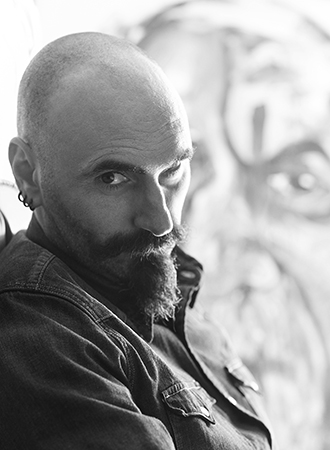The cadaver of the protoplast is born dead- it is not inbred out of desire but of the strength of the veto against it: one ought not to call this proscription C’est la Vie, but denial of the gerund of its essence∙ and then, the breath autographs the corpse with the letter, a first Ousia to punctuate the sibilant diphthongs of what at the beginning can be the Act, an Acta non verba from which the signifier shall contain the fundamental nature of the first averment’s inhalation asking the question, ‘how does the body of signifiers breathe’∙ this is the Oedipus’s dome’s entreaty, which, the analyst, will not ex-cogitate to recite, unless indeed the verge of free association is passed with his asomatic s-ex-instance, and twirling around akin to the letter of the river of a dervishing dance, whole but not holy, and, no less in flux than the letter, which is not flowing but locked into the dyspnea of a structure: that is an Ascesis and not an Act, and it could have been a memorial if this subject had not been breathed into the verbification, if only one really has faith to the process of in-activity and of the unconscious, not of the subject but of its transliteration that is a gerundus whose letter’ agency operates no less than a verb within a Cause∙ and, because the genes of the Ephesians hold the edifice dense, unyielding to the smother of a representation and a child of a discourse that cannot be but a re-semblance, as if it could include in the citation form’s liver the inhalation occupying the gracefulness of libido, of the lamella∙ for, it is dismal when it is said, sorrowfully, that psychoanalysis suffers because of capitalism and science: bring to a halt that silence of mastery and operate on a desire∙ aim at the Ergon and not so much at the being who cannot speak of its act, because, that which cannot be said requires an act∙ ears in pain have listened to those signifiers a few thousand times and cavities have been bored of that taste, for, respect is not paid to those discontents that allowed psychoanalysis’ birth and existence, which are the equal to what they were when it was at first conceived by Freud: that Letter, which is psychoanalysis, and it is a kinesis that is prepositional- never a stasis.
And, the Ephesians speak and utter about context, and not about the declension where not the signifier but the letter is possessed by the signifier in a Semiosis and use, but not in motion, different situations and areas, of a geometrical land not oxygenized by what is a mark of punctuation, to ask and wonder about the Δασεία, with its own right an accurate pneumatic Ethos indeed – yet, the truth is that: if there is a resistance, it is on the side of the analyst, as much as it is at the side of psychoanalysis: you ought not to accept quoting what has been taught to you and, instead, brush your own words by learning the alphabet that the analysand is teaching you, unless you seek to be a master aiming at knowledge and not gnosis, which is a science unlike any other: and when you set up vowels, your voice ought to expose that desire, not aiming to those ears functioning as a gaze to your jouissance, deplorable witnesses and the leftover sperm of the Other, but, let us say, desiring that heart and breath, for, that formation which is like a language and cannot be prepared without punctuation allowing for breathing: and if Doxa, that which appears to you as an idea, for, your actions and jouissance cannot speak differently, leads your way, in a manner worse than that of Docetism, which, still without the actual image of an image, though of fantasy, is holding your object, better to think of Ἔνδοξα, that which includes each being’s Ergon, not the Act but the Ascesis, hopefully to devastate your own cave where psychoanalysis’ Gerousia, those old men of honor who know but cannot listen, recompense their obols so far not for pass-aging the river that is of fire, itself a threshold, fomenting strong beliefs in the idolum tribus of the orientation: Methuselah’s death drive, absolutely not Alien but of an Other or of the Same: the practice of the letter is avalent, where the voice, not the gaze that is of the subject of the signifier, refers to the verb of the unconscious- oh, certainly an object that is Real and not a veil- the Real of an Act that is to become Ascesis: such is the practice of the subpoena that transubstantiates itself upon the same Ousia yet not re-engraved.
And, from the subject, here, is untaught the verb, letters and modicums of the Das Ding, of the corpo-real that is Ethical of a Kinesis and not of a location, full of life, participles diving into a register that is Apeiron∙ and, because many will travel and knowledge will be increased- such says Daniel: that is actually the issue at hand: knowledge will be increased, knowledge, this solidness which cannot be transmitted, and not desire roaring both, both for an Act and faith to the ethic that is Real- it strains and outcries about the Ascesis, which is not an Act: the agony of psychoanalysis requests more Herodotus and less Thucydides∙ and, if you have the sense of hearing that idiotic colorless green ideas sleeping furiously- what a miraculous deed, in-deed: you have just caught the subject’s breath beyond meaning and structure itself: the Verbification of the subject of the unconscious- this is what it is to practice with the letter∙ it is heavy, too heavy of a mouthful of air for your jouissance to listen to- and that is why you prefer death: since Freud, psychoanalysis searches for the unconscious knowledge with the hope of a transmission- oh, certainly: that is the problem- a knowledge that can be transmitted∙ and to approach the letter with the cut, to scan and produce meaning with supplementary exploit within a coordination where analysts canister to observe from afar and become technicians and not activists, and yet, the voice, the voice of he who is supposed to create speaks not and unquestionably hears not of the diaeresis of the letter, of the diphthongs that are not holophrastic, that Επιφώνημα and the punctuation vocalizing its iambic desire∙ for, a transmission there ought to, at first, be the occurrence of the tongues of the Pentecost, not knowledge∙ where, capitalism and science do not function as the Other of psychoanalysis, an Other from which we are not alone to assume the responsibility of our own Acts, for, those can only be Acts of desire∙ it paralyses and stagnates psychoanalysis from assuming its own responsibility for why it does not cause desire within civilization, and why this cool heavenly breaze, that breath not of the holy spirit, torpedoes the subject’s nasal droplets in the same manner that infirmities are transmitted and not desire∙ and listen, and think- if this is the case, then there is an impressive something, an imperative, for us analysts to mumble- unless our blameworthiness is too accurate on this devotion to the Other of capitalism, which is not a discourse but an Ousia from whose anathematic cloning discourses are twisted, one substance that we may call AnOusia because its dark matter and dark energy is ordained to plasmapheresis, precisely to subtract the Being, the, not need from the demand but desire: and what can we susurrate among thieves about the subject supposed to know if the so-called position of the analyst is not actually a position but a motion, a kinesis- and this may come along the enigma and statement that the letter designates destiny and the signifier time∙ and thus repetition is deficient from that which desires and from that that which causes it: surely the Agalma is not kinesis, but a solid, too solid of a structure even for Pygmalion to revolve into a woman: how does this transference of leprosy become a breath, if not by the testimony of the I am willing, Be clean, See that you do not tell anyone, But go, show yourself to the priest and offer the gift Moses commanded, as a testimony to them.
And the newsmonger who actually reads The Purloined Letter and produces diatonic contexts to the panegyric assembly of the signifiers, may use the Ὀκτώηχος to cantillate the divertimento of Letters, that, that this is how the Subject of the unconscious is Verbificated.

